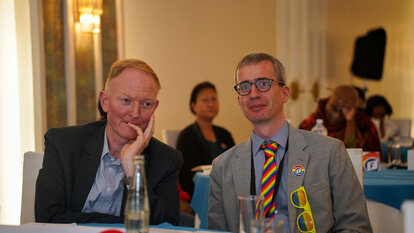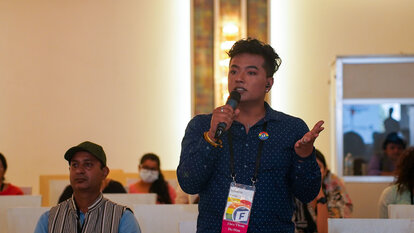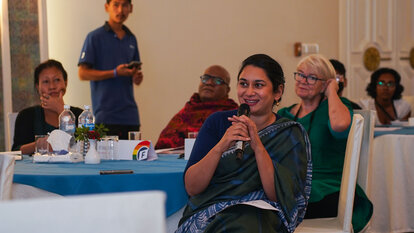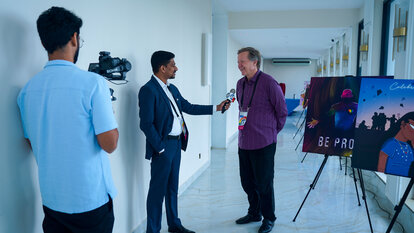LGBTQI+
Born With Pride Conference

Born with Pride Session 1
© FNF South AsiaIntroduction
A two-day-long ‘Born with Pride’ conference was successfully organized by the Friedrich Naumann Foundation for Freedom (FNF), South Asia, in collaboration with the Embassy of the Federal Republic of Germany in Kathmandu, Samriddhi Foundation and the German Nepal Friendship Association. The presence of seven keynote speakers across the Nepali and European political spectrum, 21 speakers from across South Asia and more than 100 participants demonstrated its relevance and helped meet the conference’s objective of engaging with multiple stakeholders such as the LGBTQIA+ community, politicians and civil society, providing visibility and networking opportunities to the LGBTQIA+ community.
The conference began with keynote speeches from the dignitaries. Dr. Carsten Klein, Head of FNF Regional Office South Asia, highlighted the importance of such a conference with respect to healthy dialogue, networking, and coming together to solve a slew of inequalities and discrimination. Former Minister of Urban Development and member of the House of Representatives Ram Kumari Jhakri emphasized the need for convergence of efforts from political and civil society to achieve the common goal of promoting and protecting queer rights. Yannick Shetty, Member of the Austrian Parliament, highlighted the need for a value-based foreign policy that condemns discrimination.
There were three interactive sessions on Day 1 of the conference: ‘Queer in Power’, ‘Queer Goes Viral’, and ‘Queer from Legal Lens’.
Queer in Power
The session was moderated by Niladri R. Chatterjee, where discussants Akkai Padmashali (India), Shailee Chaudhry (Nepal), Aisha Mughal (Pakistan) and Andre Lehmann (Germany) engaged on the challenges and opportunities encountered by a queer person in politics. The lack of awareness and differences regarding various terminologies and sexual identities were highlighted. The rise of populism across Europe, increasing hate speech, physical violence against sexual minorities and the existence of colonial-era laws in many South Asian countries were some of the issues highlighted. The session emphasized the need for collective action to formulate/ change legislation in South Asian countries and the need for massive campaigns for the cause.
Queer goes Viral
Smita V (India), Tenzin Marico (Tibet) and Tashi Tsheten (Bhutan) made presentations during the session, highlighting the breakthroughs social media has made in finding matches, streamlining communication and gathering thousands of supporters. However, speakers opined that media surveillance, cybercrime and increasing digital scrutiny also impeded free communication. Digital inclusion and the recruitment of people speaking the local language were identified as instrumental in stemming online hate and misinformation. The critical role of queer movies and podcasts was emphasized.
Queer from Legal Lens
The session was moderated by Mansi Singh, where discussants Zameer Kamble (India), Jannat Ali (Pakistan) and Aritha Wickramasinghe (Sri Lanka) questioned the implementation of rights enshrined in national legal texts. Dr. Ambedkar’s vision of positive discrimination and the Buddha’s tenets of liberty and compassion were emphasized as guiding principles in achieving legal equality and fighting for the queer cause. Speakers applauded the progress that Pakistan made in promulgating the Trans-gender Protection Act but highlighted the risk of its newly-granted rights being denied, owing to its misleading interpretation by religious leaders.
The second day of the conference began in hybrid mode (both online and offline); Alka Khanal from the German Nepal Friendship Association recognized the conference’s significance in advocating for queer rights. She said, ‘I appreciate the contribution of your foundation [FNF] to bring some changes in thinking in the society’. She also highlighted that German-Nepal Friendship Association, with its over 800 members, could be a solid pillar for German-Nepal friendship and Cooperation and have the potential to be a network for diplomacy, humanitarian aid and consulting activities. Sabrina Schmidt-Koschella, Consul and Head of Administration, Embassy of the Federal Republic of Germany in Kathmandu, narrated the historical difficulty Germany faced in guaranteeing the rights of the queer community and its success in protecting these rights today. Sunil Babu Pant, an openly gay former politician from Nepal, expressed his happiness at the pan-South Asian queer community coming together for collective activism; he also expressed his approval of South Asian society creating, though gradually, a positive environment.
While speaking at a book launch in the program, Sebastian Woitsch, Director of the Goethe Centre in Kathmandu, made apparent his commitment to supporting people of sexual minorities and the queer community.
Tashi Choden from Bhutan presented her struggles as a queer person in the fashion/ modelling industry, where commentary on a person’s body is unfortunately the norm. Self-determination and willpower were highlighted as disciplines essential in surpassing such social pressure. Basira Paighan of Afghanistan underlined the importance of accepting oneself before countering society. Nayab Ali from Pakistan shared her tragic experience of an acid attack while speaking and advocating for human rights. However, she vowed that such a cowardly attack would not deter her from fighting for the equal implementation of human rights and the rights of queer persons. Speakers (who wish to remain anonymous) from Bangladesh shed light on the challenges of negotiating identities and visibility in Bangladeshi society, as the country still criminalizes homosexual identities. They highlighted the importance of working behind the scenes to create a safe space for the community.
Queer Eye: Visibility of queer persons in mainstream media
The session was moderated by Bhoomi Harendran, with discussants Jerry Johnson (India) and Raphay Shahzad (Pakistan) comparing notes on the role of media and queer visibility. The discussants highlighted how politics becomes personal when it comes to queer identity. They stressed that energies should be directed against smear media campaigns targeting the community and socio-political victimization. The media’s role is multi-dimensional: on one hand, queer talent is increasingly accepted by the media and public and encouraged; on the other, the same media shapes a narrative about the queer community and relevant laws, which in most cases are at odds with the queer cause. They recommended an increase in genderless storytelling, character and expression in the media.
Rimpoche Monk (as a representative of the Dalai Lama and guest at the event) thanked the organizer for the conference and committed to working more to reinforce human rights irrespective of gender and sexual preferences. H.E. Dr. Thomas Prinz, Ambassador at the Embassy of the Federal Republic of Germany, Kathmandu, during the prize distribution for the visual arts competition, thanked FNF for the conference and emphasized the importance of such events in creating a more inclusive environment for queer communities.
The two-day conference concluded with extensive media visibility, with many English and Nepali national news outlets and magazines have covered the program.
Conference Snippets

Born With Pride - Day 1
© FNF South Asia
Born With Pride Conference
© FNF South Asia
Born With Pride Conference
© FNF South Asia
Born With Pride Conference - Art Gallery
© FNF South Asia
Born With Pride Conference
© FNF South Asia